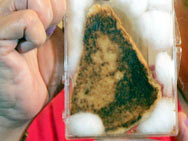 column_buckwolf
column_buckwolf
Hungry for Miracles? Try Jesus on a Fish Stick

(Page 2 of 3)
But before he threw the charred cake to the dogs' dish, he took another look.
"I said, 'That looks like a rock singer,' and then my son goes, 'It looks like Jesus,' and I said 'Well, it does, yeah.' "
So he kept this burnt offering as a conversation piece. Now, he's promising to put it on eBay, perhaps as the perfect keepsake for those who admire both St. Paul and Mrs. Paul. Holy tartar sauce sold separately.
3. The 'NunBun' of Nashville, Tenn.
A good cup of coffee is hard to find, and so is a breakfast roll with an uncanny likeness to Mother Teresa. On the morning of Oct. 15, 1996, the store manager at the Bongo Java coffee shop looked at a pastry and found the saintly nun staring him in the face
The legend of the "NunBun" was born. The confection was shellacked for all eternity as the media converged for a breakfast treat that was soon to be known as "The Immaculate Confection," "The Divine Dough" and "The Cin-a-Nun."
The bends of the roll just perfectly capture Mother Teresa's face, draped in a shawl, with cinnamon accentuating her deep-set, soulful eyes. Disbelievers still claimed the cinnamon roll more closely resembles Doc from "Snow White and the Seven Dwarfs."
Nevertheless, news spread worldwide, even to India, where Mother Teresa asked lawyers to make inquiries, concerned that a coffee shop was capitalizing on her name with souvenir T-shirts, postcards and bookmarks.
Eager not to earn the famous nun's ire, Bongo Java quickly agreed to remove her name from any items for sale, and strip certain offensive terms like "immaculate confection" from promotional literature. The coffee shop got to keep its trademarked term "NunBun" and sell images of the roll.
The death of Mother Teresa in September 1997 did not dampen believers' enthusiasm. The NunBun has joined Opryland as one of Nashville's most famous tourist attractions.
4. The Holy Eggplant
In March last year, a woman in Mendhasalis, India, sliced into an eggplant and found seeds spelling out "Allah" in Urdu script. Now, the vegetable is part of a shrine near her home, where some treat it as a religious icon.
Amazingly, this is not the first time an eggplant has been exalted. In 1990, Muslims in nothern England also reported finding "Allah" spelled out in the seeds of an eggplant, only this time it was written in Arabic.
"This clearly shows people that our god exists. It is a message to the nonbelievers," Abdullah Patel told Reuters, claiming that 4,500 people had visited his home within just weeks of the incident being reported.
In one more case of this food-of-the-gods phenomena, in 2002, the Jessani family of Mumbai (formerly Bombay), India, returned from the market with a potato shaped like the elephant-headed Hindu god Ganesha. They now welcome 60 to 70 pilgrims a day, eager to see this divine vegetable, according to local press.
What does this all say? Perhaps God is everywhere, and in some cases, he's fattening.
Buck Wolf is entertainment producer at ABCNEWS.com. The Wolf Files is published Tuesdays.










